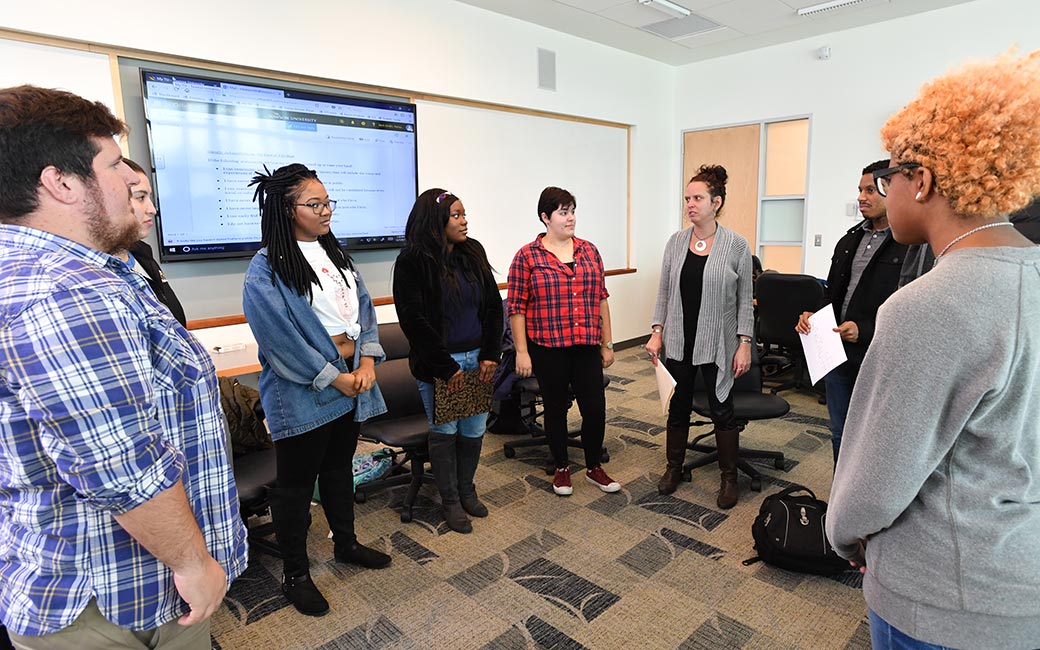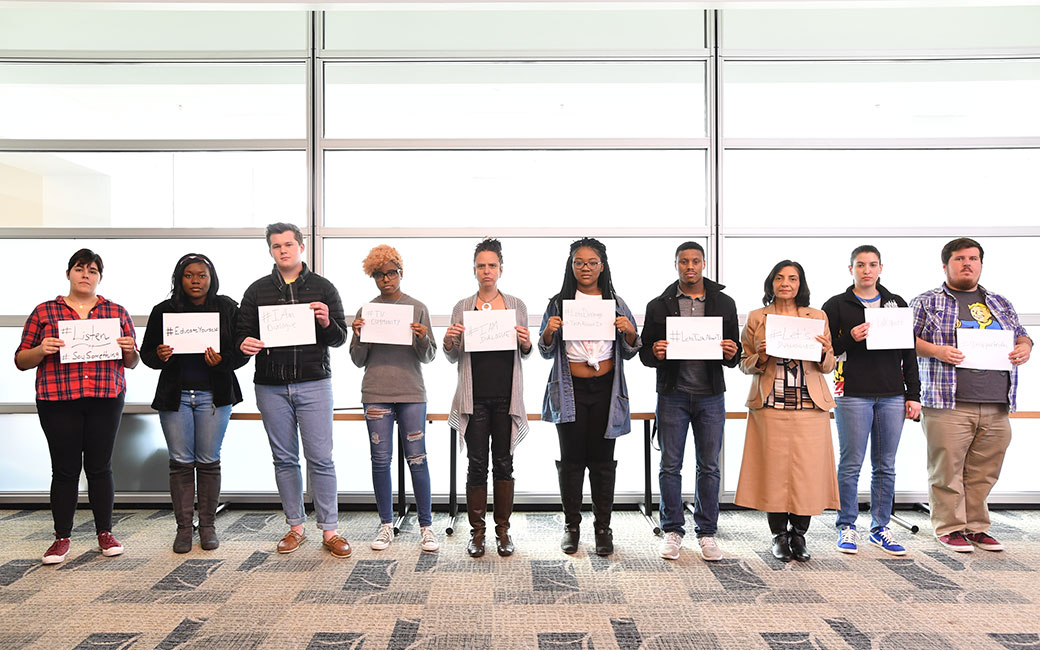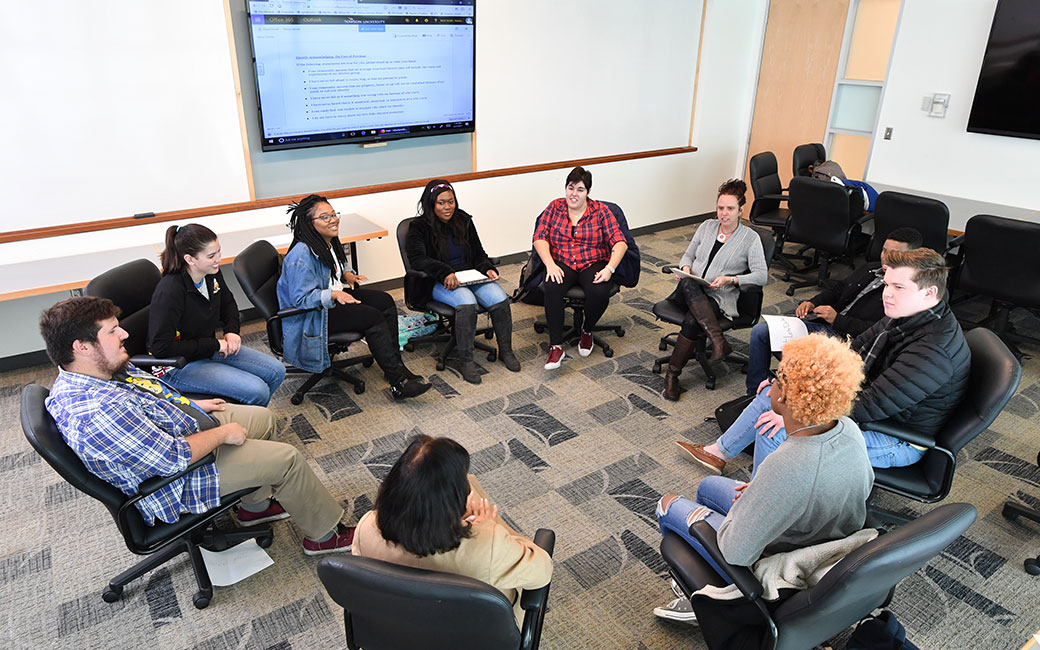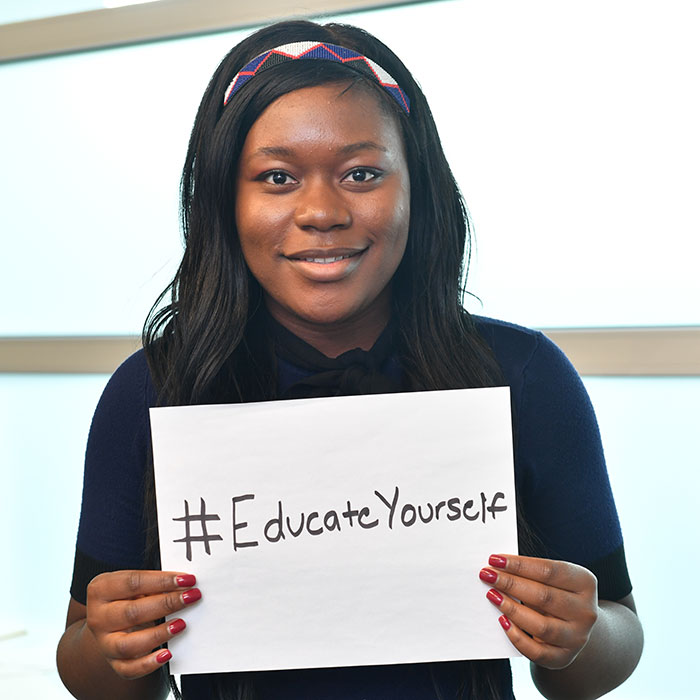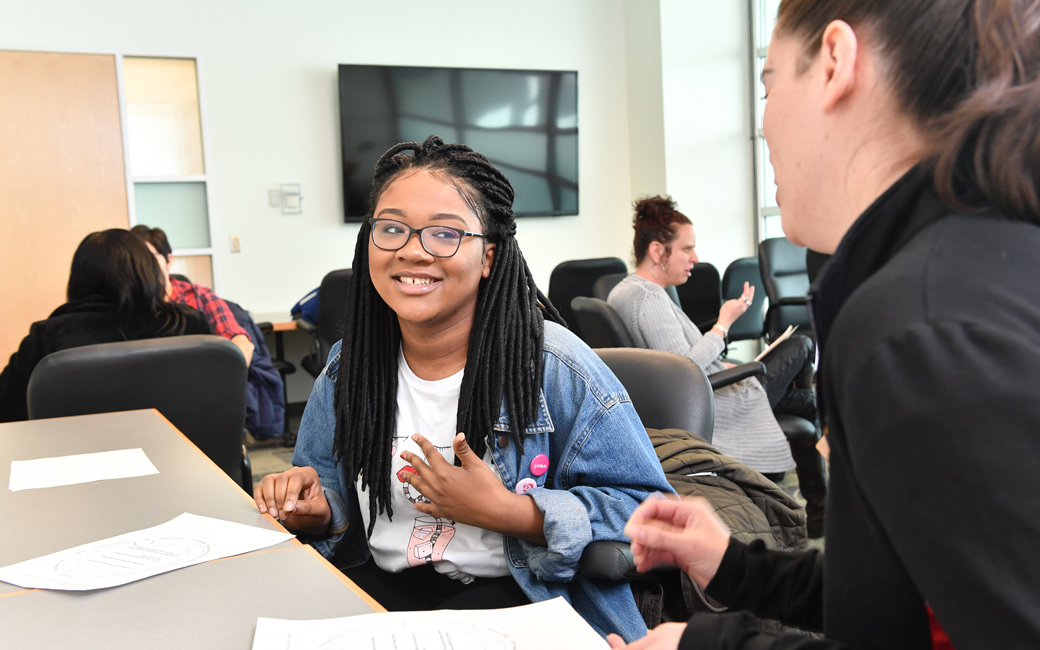
Dialogue@TU
Dialogue@TU embeds a dialogue component in select courses while also expanding the reach of dialogue training to all staff, faculty and, more recently, undergraduate and graduate student leaders.
Dialogue Defined
Dialogue@TU views dialogue as both a perspective and a skill. Dialogue as a perspective prioritizes our increasingly diverse campus to find more opportunities to learn more about each other, our identities, our experiences, and our views. Dialogue as a skill focuses on practicing deep listening, suspension of judgement, and navigating challenging moments by turning to curiosity and open questions.
Dialogue can be a useful tool in any interaction.
Sustained dialogue refers to the same community or group with a shared commitment to examine their relationships, conflict and change by coming together on a recurring basis to practice dialogue skills as a means for reaching deeper levels of understanding and strengthening relationships and the collective capacity to navigate conflict.
Intergroup dialogue (IGD) is a specific type of sustained dialogue in that brings together individuals from two or more social identity groups with a history of tension or conflict (e.g., People of Color and White people; LGBT people and heterosexual people; Christians, religious minorities, and secular individuals; women and men). The goals of IGD include: (1) creating sustained, face-to-face communication across groups; (2) raising social consciousness (e.g., about social inequalities, one’s role in perpetuating these inequalities, and the personal impacts of these inequalities on oneself and others); and (3) building bridges across group differences and a commitment to work toward social justice together.
Dialogue
Dialogue can be a component embedded into an academic course, a component to a department, team, committee, or other organization’s regular meeting structure, as well as tool for standalone meetings, discussions, forums, or other interactions.
In response to recent campus and national events, Dialogue@TU is collaborating with the Office of Inclusion & Institutional Equity on a variety of anti-racist education and training events.
Watch this video to see how Dialogue@TU makes a difference in our TU community.
How is Dialogue@TU Different Than Other Diversity Programs?
Dialogue@TU represents a sustained conversation over a period of several weeks to have individuals more deeply and consistently engage with a topic that typically creates tension and conflict. Students meet in small groups for a period of 8 weeks to discuss one social issue (e.g., racism). The dialogue is facilitated by two individuals trained in Dialogue@TU. The students and facilitators must equally represent the different identities associated with the dialogue topic (e.g., People of Color, White people). This model has been shown to increase individuals’ empathic understanding of different perspectives, as well as to raise self-awareness and cultural competence.
Dialogue@TU has been embedded in courses since Fall 2016. Some of these courses include: PSYC 470: Multicultural Psychology, EDUC 203: Teaching and Learning in a Diverse Society, TSEM: Diversity Dialogue for Social Justice, TSEM: Religion, Race, and Gender and MNGT 430: Managing Diversity, Equity and Inclusion in the Workplace. Are you interested in having dialogue as part of your course? Contact us dialogue AT_TOWSON
“It challenges you to think outside the box and explore your own beliefs and personal attitudes.”
Dialogue@TU Training
The 4-part Dialogue@TU Training Series covers both the theory and skills of dialogue, along with opportunities to practice skills in live dialogue (Levels 1 and 2). Level 3 provides the opportunity to gain practice as a co-facilitator in a dialogue. Faculty and staff obtain verification of professional development completion after the Level 3 training. The Level 4 training provides the opportunity to be certified as a dialogue facilitator.
Dialogue@TU Certification Training
A description of the training modules is included below. There are no scheduled trainings at this time. Check back for future updates.
This training will cover the goals of Dialogue, the most recent Dialogue research including the process and benefits, the nuances of dialogue, discussion, debate, and diatribe, as well as intensive training connected to the co-facilitation process.
This half-day training will provide Level 1-trained staff and faculty with the practice settings to both facilitate and observe dialogue on difficult topics. This will also be an opportunity to learn more about the in-course, sustained Dialogue model, as well as out of class facilitations. Level 1 Training (or comparable experience) is a prerequisite for Level 2 Training.
This half-day Level 3 training will provide Level 1 & 2-trained faculty and staff with the practice settings to co-facilitate, participate in, and observe dialogue on difficult topics. This will also be an opportunity to learn more about the in-course dialogue model for future courses. Level 1 & 2 Training (or comparable experience) is a prerequisite for Level 3 Training. Registrants will be paired with a partner that they must meet with prior to the training.
- Previously trained Dialogue facilitators (whether at TU or elsewhere with a comparable program) are also welcome to register for this level as a refresher course.
This Level 4 training will provide a more comprehensive dialogue facilitator training with co-facilitation practice rounds, feedback from participants and trainers and practice engaging in a dialogue as both a participant and a facilitator. This training will also include more specific tips and techniques utilized by dialogue facilitators, including how to navigate tense and difficult situations.
- Successful completion of this Level 4 training results in Dialogue@TU facilitator certification.
- You will be paired with a partner that you must meet with prior to the training.
- Level 1, Level 2, and Level 3 Trainings (or comparable experience) are prerequisites for the Level 4 Training.
Questions? Please email dialogue AT_TOWSON.
Campuswide Immersion Committee (CWI)
| Member | office |
|---|---|
| David Anderson | Inclusive Excellence Education and Support |
| Neil Andrito | Housing & Residence Life |
| Nadea Armogan | Inclusive Excellence Education and Support |
| Patricia Bradley | Office of Inclusion and Institutional Equity |
| Mariah Fleury | Student Government Association |
| Joyce Garczynski | Library |
| Romy Hübler | Civic Engagement and Social Responsibility |
| Brian Jara | Inclusive Excellence Education and Support |
| Charis S. Lawson | Civic Engagement and Social Responsibility |
| Elora Orazio | Student Affairs |
| Katherine Orlando | Instructional Leadership & Professional Development |
| Christa Schmidt | Department of Psychology |
| Heather Sorensen | Event and Conference Services |
| Jimmy Thren | Student Outreach and Support |
